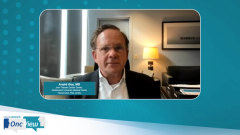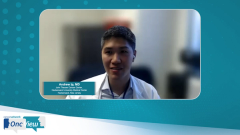
CAR T-Cell Therapy in Mantle Cell Lymphoma
A comprehensive overview of CAR T-cell therapy as a treatment modality for mantle cell lymphoma, including insights on the ZUMA-2 clinical trial.
Episodes in this series

Transcript:
Andrew Ip, MD: The next couple of questions all relate around CAR T and cellular therapies. The first question to you or comment is about the ZUMA-2 trial, which I know you know all about. The 3-year updates on brexu-cel [brexucabtagene autoleucel] and mantle cell was presented at ASH [American Society of Hematology] and ASCO [American Society of Clinical Oncology] last year.
Andre H. Goy, MD: Brexu-cel was the ZUMA-2 Trial with patients with relapsed/refractory mantle cell lymphoma who have failed chemoimmunotherapy and BTK inhibitor, a patient population that traditionally from real-world data does very poorly with a median survival of only a few months. Obviously, this survival number varies [based on the] prior therapy they had, but a population with truly an unmet need. What we saw in this population with brexu-cel anti-CD19 CAR T-cell therapy was the CR [complete remission] rate was over 90% and the response rate was well over 60% and highly durable. And then with the 3-year follow-up, median follow-up 2 years after the infusion of the brexu-cel, 49% of the patients remain NED [no evidence of disease]. So there's a large number of these patients you and I have treated that are likely cured in that situation. And that brings a real question for all CAR T. First of all, toxicity is always perceived in CAR T-cell therapy as being the main issue. We now manage these very well with preemptive measures of steroids and tocilizumab, etc, but it’s where we are going to use this CAR T cell. It’s approved in the second line in mantle cell lymphoma in the US, but the next step is obviously to look at consolidating up front in patients with high-risk features and using CAR T-cell therapy as a finite therapy consolidation approach.
Andrew Ip, MD: There was an interesting part to the 3-year follow-up. We've spoken about how you can get the maximum peak or expansion in the first couple of weeks of delivering these CAR T infusion products. And they mentioned those patients who responded had over double the number of CCR7+ cells, or basically the CAR T expansion.
Do you want to comment on how we could really predict response to CAR T? And then, of course, there is another question of how we could augment the T cells with something like ibrutinib. There was a study from Australia looking at tisa-cel [tisagenlecleucel] in mantle cell lymphoma as well.
Andre H. Goy, MD: So traditionally for CAR T, a few things that really come to mind that are really important is that when you have a novel agent, you want to see what the clinical benefit is in the real world, outside of a somewhat selective population on clinical trial. There's been now registries from Europe and the United States across all CAR T-cell in lymphoma, including in mantle cell lymphoma, presented including at ASH last year, some of which we participated in. It repeatedly showed that the response rate and the CR rate were exactly in the same range, with the response rate over 90% and the CR rate over 70% in relapsed/refractory mantle cell lymphoma, often more heavily pretreated, and up to 80% of these patients did not qualify for the ZUMA- 2 clinical trial due to the criteria. Part of it was because of comorbidity, etc This is really promising because it confirms the clinical benefit of CAR T-cell therapy and brexu-cel in mantle cell lymphoma.
To your question on how we can predict, we did the analysis on the ZUMA-2, which predicted that the more amplification AUC [area under the curve] you have at the beginning on the T-cell amplification with CAR T is what matters. And the CD28-driven transmembrane costimulatory molecule in the CAR T construct leads to an earlier amplification, and I am convinced this is what matters in large cell and mantle cell. And the peak that you had was really correlated to somewhat toxicity but to duration of response and outcome.
And what was also important is that the traditional prognostic factors in general in CAR T in lymphoma do not apply as much comparing with chemotherapy. And the blastoid variant of p53 still had a high CR rate, maybe somewhat less durable. This is starting to emerge as a prognostic factor. You also alluded to the ways to improve the outcome, and the observation that was done that when a patient had been on their last therapy on ibrutinib, they had a higher amplification than if they had been with no BTK or a different BTK, particularly acalabrutinib. There was a high amplification, and the rationale behind this is that BTK interferes with ITK and then has an effect on the T-cell amplification, T-cell durability, and T-cell immunological synapse in CLL [chronic lymphocytic leukemia], well documented now as being an immunomodulator that has a benefit in CAR T patients.
This was the rationale for a clinical trial that combined ibrutinib and tisa-cel, where the CR rate was up to 85%, more than double what had been in mantle cell lymphoma, and highly durable, over 70% MRD [minimal residual disease] negative. To me, this was a very important abstract at ASH that showed that with something that is pretty easy and with no other toxicity clearly showed a benefit. It's not for patients who responded to ibrutinib or a BTK in mantle cell. This patient had received prior BTK and prior ibrutinib. So this is clearly through the off-target effect of the BTK inhibitor. This is very promising and being explored in other lymphoma as well.
Transcript edited for clarity.
Newsletter
Stay up to date on recent advances in the multidisciplinary approach to cancer.








































